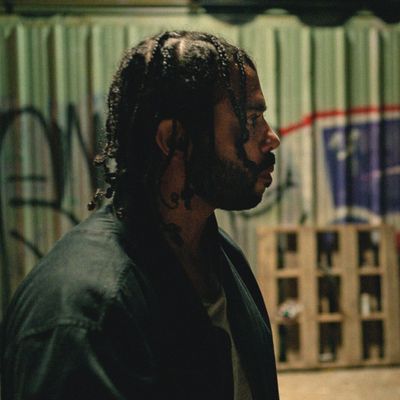
This review originally ran during the Sundance Film Festival.
There is one five-minute sequence in Blindspotting where all its competing elements come together for a brief, shining moment. And it happens to be the story of how Collin (Daveed Diggs) got arrested. Narrated like a speeding train by a random passerby (Utkarsh Ambudkar), we hear and see the unlikely story of how the undercurrent of resentment in a recently gentrified neighborhood and flaming Scorpion Bowl resulted in grievous bodily harm and a prison sentence for Collin. It’s a style that is not exactly unfamiliar, but Blindspotting’s slightly surreal send-up of modern annoyances and the real, life-altering consequences of the violence that ensues collide fast enough to induce whiplash — in a good way.
Unfortunately, the scene ends, and we have the rest of Blindspotting, a comedy-drama so caught up in its teachable moments that it often fails to come off like either. Written by first-time feature writers Diggs and Rafael Casal, and directed by first-time feature director Carlos López Estrada, it’s very much a freshman effort, in ways that occasionally strike a surprising note but mostly land with a thud. Diggs and Casal play best friends Collin and Miles, a black man and a white man who, despite being attached at the hip, experience life and justice and privilege in markedly different ways — ways they’re not altogether willing to see. During Collin’s final three days on probation, he witnesses a police shooting that starts his wheels turning about how he and Miles fit into a toxic tapestry of institutionalized racism and violence.
Neither Diggs and Casal’s script nor Estrada’s directing are outright inept, but neither ever feel like they’re serving each other properly. The film has a kind of cartoonish, disorienting sense of movement to it, hypersaturated like a ’90s music video, constantly busting out crane shots when the scene hardly calls for one. There are many meandering detours around the neighborhood in the film’s first half. We meet Miles’s girlfriend Ashley (Jasmine Cephas Jones) and their son, and Collin’s old-school activist mom. We visit Wayne Knight, the New-Agey proprietor of a photography gallery; we stop by a beauty shop for some black-market flatiron deals. On the plus side, the film feels confidently happy to just hang out for a while and color in its melting-pot surroundings. The two friends often break out into freestyle-rap conversation, riffing on the vegan fast-food joint or the drudgery of their jobs as movers. But like many aspects of the film, it starts off fun and ends up feeling like homework.
The film gets a lot of its mileage out of how Miles and Collin play against stereotype — Collin’s the one buying green juice at the same corner store Miles buys his loosies; Miles rocks a grill and buys a gun and Collin helps his ex study for her psychology degree. (Even their names feel like they’re supposed to be a subtle joke.) A lot of this results in some hacky “hipster things” jokes, but it all builds to one of the film’s more interesting subplots, which is Miles’s reckoning with his own whiteness. Throughout the film, he’s the one more vocally and physically angry at the gentrifiers — even sporting a shirt that reads “Kill a Hipster, Save Your Hood” at one point. But after a brutal incident that plays out like a cruel inversion of the aforementioned Scorpion Bowl incident, Collin realizes that Miles’s unresolved grappling with his own privilege could destroy both of them.
That’s the film at its most subtle. When it turns to the police shooting incident, and a climactic turn of fate brings Collin face to face with the cop who pulled the trigger, all subtlety goes out the window, and frankly, I had to watch the scene through my fingers. It’s not that Blindspotting doesn’t have important points to make about how individuals live in a collective history of racialized violence. It’s that it has a hard time making those points feel organic to the story and style, whether it’s going for realism or over-the-top musical-theater territory.

